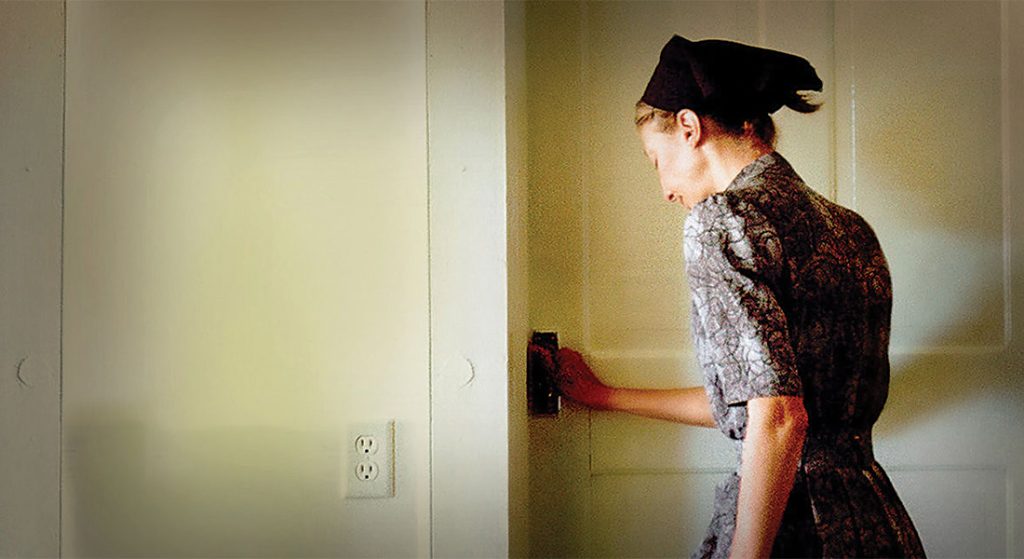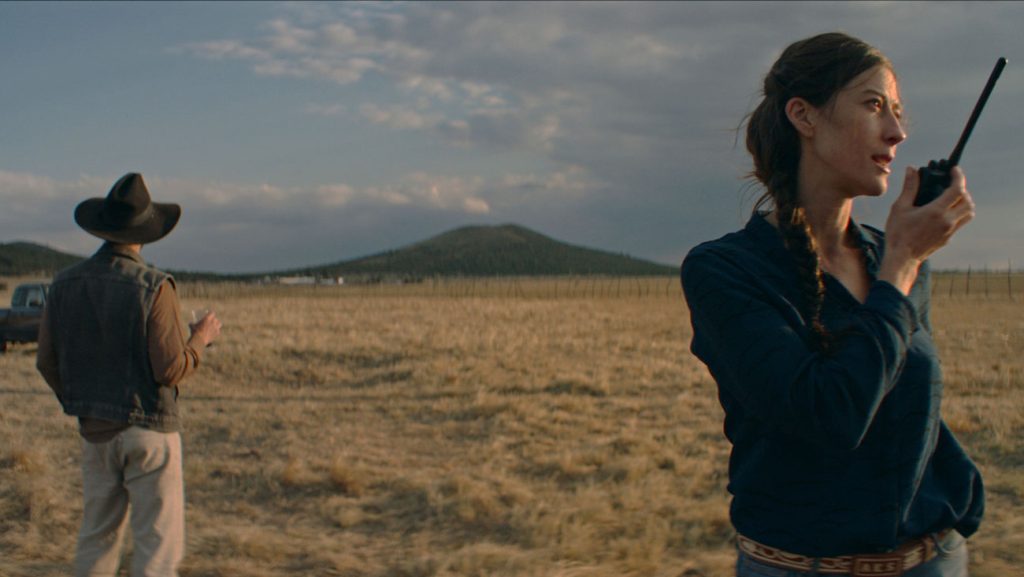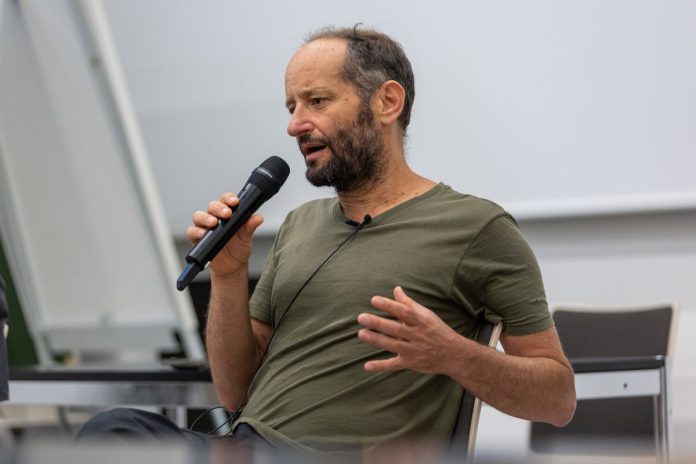One of the most original and provocative voices of modern cinema, Carlos Reygadas has been leaving his mark since Japón (2002) captivated audiences with its unsettling strangeness. With a body of work that is intense and visceral, defined by a deep exploration of existence, faith, the body and nature, his films—such as Battle in Heaven (2005), Post Tenebras Lux (2012) and Our Time (2018)—invite viewers into a cinematic experience that is at once physical and spiritual, where time, space and emotion merge into a rhythm all their own.
While preparing Wake of Umbra, a new project he’s been meticulously crafting for years with the precision and rigour that define him, Reygadas now returns to the past to restore Silent Light (2007), a masterpiece shot within a Mennonite community in northern Mexico. This 4K restoration marks the filmmaker’s reunion with a pivotal moment in his career—a film that, despite being more conventional in form, won over 30 international awards (including at Cannes).
Capitalising on his presence in Locarno as a juror in the main competition—and his return to Silent Light—we sat down with the Mexican director to discuss his career, his outlook on cinema, and what the future might hold from him.
You’ve returned to one of your own films two decades on. What memories—good or bad—does Silent Light bring back?
Actually, only good ones—nothing but good. I don’t think much about the film itself. I never rewatch my films once they’re finished, unless I have to work on them again, as I am now. But I always remember that time with great intensity: the months of preparation, building the houses, the friends, the work, the sun, the daily light, every single day. And the Mennonites, who were our friends—what a beautiful place that was.
It still is, but precisely after the year we worked there, many of those stupid drug wars began. That northern region became a dangerous place. I think about that a lot. Still, I learned so much on a political and social level about the Mennonite world. And I still reflect on it. I learned far more than what appears in the film, because that’s something else entirely—it’s the result of my experience, a fragment of it. The film is only a partial reflection.
When you think about your films as a whole, what role does Silent Light play?
It was built in a traditional way—past, present and future—and it works seriously with actors and dialogue. Formally, it wasn’t a particularly risky bet. In that sense, it’s a more conventional film.
Do you see cinema as a space for confession, for therapy?
No, absolutely not. Not at all.
How do you see cinema?
For me, cinema is an expansion of reality. It’s not a representation of reality—in the best case, it’s a presentation of reality; ideally, it’s an enlargement. Reality creates, and cinema creates a way of seeing, a way of thinking about each object. In this way, each object becomes new. When it works, cinema grants access to a small world—small, of course, I don’t think it’s anything grandiose. But it’s one more little place. And, if we’re lucky, films become part of human history, part of what we do and have done. But no, not in any way a personal therapy. That’s why earlier I spoke about memories of friends, of what we lived through—but that’s life. Life is a permanent therapy. Cinema isn’t a specific therapy.
Space—geographical and emotional. How do you think about these two elements in your filmography?
They’re very important. Cinema takes place in a physical, geographical space, in the external world—but that’s not enough. You need to understand how cinema functions. And cinema works, as you put it, by opening up an emotional space. In painting, for instance, or photography, there’s just a flash, a glimpse, a fixed instant. The imagination connects with what’s seen and can create something to the left or right. But in cinema, as in life, things happen through accumulation.
Regardless of whether time is linear or circular—which is a slightly clichéd idea—cinema has an order. There’s timing, it happens mechanically. And it’s this unfolding of events that generates an emotional space, in which a sense of existence takes shape.
In that context, for example, we can see a person thinking. In a photograph or a sculpture, it would just be the figure of someone thinking—maybe they’re thinking, maybe not. But in cinema, even if someone just stares at a wall, if the emotional space is well constructed, we know that person could be thinking. That moment becomes revelatory of the inner act of thought. That’s why ideas like slow cinema or similar labels are false. It’s not about speed—like a fast or slow car. The question is what’s happening inside everything we see, based on what’s being built through the accumulation of shots. That’s the emotional space.
What matters is that things happen. And those things can happen in the absence of movement, in the absence of words. Things occur within the images, and because of that, they can spill beyond the screen. But it’s essential that in cinema, something is always happening—as in life. In life, something is always happening. If someone is completely bored and feels nothing is happening, it’s because they’re disconnected. When cinema achieves that, we enter that world—and it’s no longer a representation, it’s an event. And that, for me, is the most important thing. That’s what I try to do.

People often link time, movement and space… How do you see time within that space, as movement?
I insist: time doesn’t necessarily have to do with space or movement. No, no, no—space and time are one and the same. We separate them in our minds, but they’re inseparable. You can’t define space without time, nor time without space. They’re intertwined concepts, like a chain—one single thing, not several rings linked together. That’s how I see them.
It’s on this basis that we build, pre-visualise, and then cinema happens. A bit like life itself. For me, cinema is the art form that most closely resembles the way we experience existence. It’s not merely representational, like literature, nor purely sensory, like music. It unfolds in a way very similar to life: apparently, nothing makes sense. Nothing has inherent meaning, a priori. Everything gains meaning as things happen and as we observe them. If we don’t observe what’s happening, nothing happens. That’s why an engaged spectator is necessary. A distracted viewer generally doesn’t work for art.
Talking about space and territory, we can also turn to the body—the body as a kind of space, a territory in itself, often guarded, sometimes breached. How do you see the body? And how do you bring that idea—of the body as space—into your films?
Those are quite intellectual concepts—body, space, invasion. For me, there are only atoms, molecules. The body, the territory—no, there’s just molecules and a perception of the external world. And how we relate to that—this always escapes those organised streams of thought, like the ones your words describe.
Those currents pass, they expire. They’re explanations that grow old, all of them. Structural explanations of that kind always expire. I think more in terms of a direct relationship with bodies, case by case, individually. I don’t reject history, nor historical thought—but that only serves to orient us, like a compass. Once we’re oriented, and keeping the compass in mind, we must set it aside and live solely in the molecular dimension.
When we think about your cinema, terms like “existentialism”—a philosophical movement—naturally come to mind. Yet you talk about molecules… Are these ideas far apart, or connected? How do you see the relationship between them?
They’re equivalent—or nearly so. “Existence,” not “existentialism.” Existentialism is something else, though close. But existence—yes. Perhaps I open myself as wide as possible and return to the question: why do we do things? Why do we perceive that we exist, and want to try to connect with that? Do we want a mirror? We’re always searching for mirrors where we can find resonance—in community, in reflection. And in art, of course, that’s why we make it: we’re searching for that reflection.
For me, existence is the sensation of being in the world. And I believe we make a film to get closer to that sensation of existence—but in an object, not in a lived experience, yes, in an object.
Looking back at your earlier self, what shifts in your thinking or approach stand out to you now?
I think the aspect that’s changed most is how curiosity functions. Curiosity, for me, is the fundamental way we approach the world and engage with it. Before, I had a very active curiosity. Today, I still have a great deal of curiosity—as much as before—but it’s different. It’s a curiosity that doesn’t advance, that stays still and receives. It tries to receive, it doubts much more about everything, it knows that everything could be different from how it appears. But I always keep alive an investigative drive. It’s something that’s within me.
Is that what you’re always trying to grasp—not just with the mind, but through feeling: how things happen, why they happen, who we are?”
Yes. Always trying to understand, to feel how things happen, why they happen, who we are. And questioning everything—not for sport, but out of a desire to reach the root, the origin. That’s always within me. And it’s also beautiful in cinema to question cinema itself—what it is, how it works, what it could be, what it isn’t. Finding the negative side of things is essential. Especially in this society we live in, which always talks about positivity as a kind of escape—which is quite foolish. People talk about “positive energy,” but any child knows energy needs two poles. Now I try to live within that tension—the balance between opposites.
Cinema has changed—streaming, the shift from analogue to digital. How have these changes shaped your work, and your way of seeing?
The aspects you mention are more apparent, but fundamentally they’re technological—not essential, not molecular. They only have partial, peripheral importance.
In practice, I made my last film digitally, but the one I’m finishing now is on film. That already says a lot about what I think. I don’t want to be essentialist or romantic—simply, I think cinema is better on film. I see many positives in digital: the capacity to work, image correction with countless tools. But like all benefits, there are dangers. If we become victims of the desire for image perfection, we de-nature everything and drift away from beauty. We can easily lose the idea—just like with fake news. Not just beauty, but truth. If everything is possible, nothing is true.
I feel that in these current changes—not just technological, but broader, fundamental questions—some of these questions have led to dead ends. We’re in a crisis. I feel, for instance, that the concept of love has diluted—the physical love, romantic love, but love in general, as devotion. Still, I believe it’s just cycles, that everything returns. Just turns, nothing more.
Streaming has changed how people watch films. That’s true. Cinema in theatres? I wouldn’t say it’s disappearing, but it’s almost gone—which is regrettable. But you know, 15 years ago they said bookshops would vanish. And now bookshops are back. So I don’t know. My role, as someone who makes films, isn’t really that of a sociologist observing what’s happening to cinema. It’s simply to make the films I have to make. The outcome will be what it must be. What can’t be controlled shouldn’t steal our time.

We’ve been waiting seven years for Wake of Umbra. Where does the film stand now?
Yes, I know it’s taking a long time. Let’s say five years, since in the first two I was doing other things. But five is still a lot, that’s true. Financing has been difficult. Then came the coronavirus. And I work in a very delicate way—I don’t have a large crew. I look for actors on the street, there are several. This time I have four main protagonists, hard to coordinate. That takes a lot of time. Also, what we mentioned earlier—the digital issue. Realism has almost disappeared, because now with digital you can create something that looks realistic but isn’t real. It’s a trap. But it brings many possibilities—for instance, placing some birds up there watching and listening to us. I like being able to do that. But for it to feel real, not cartoonish, it demands a lot of work.
I’ve also noticed a lot of cinema today taking a comedic, unserious turn. I think it’s an easy way to escape the demands of more complex work. That’s why it’s taking so long. Sound—it’s not just about adding music. It’s about searching, searching. To make a strong film, you need deep investigation. Always investigating.
Are you shaping the film in the editing room?
Yes, we’re nearly there. The film’s already travelled through Poland, Portugal, Sweden, Norway, and much of Mexico. We’ve shot about 95 to 98 percent, and some 70% is in the edit. But sound and visuals still need time and care.
On the subject of how we experience cinema today—you’ve said you no longer like the obligation of watching a film all the way through as a juror, and yet you’ve been on multiple festival juries. How do you make sense of that tension?
I see cinema differently now. I’d like to be able to watch long Wagner operas, five hours long—where you can come and go, watch two hours one day, have favourite parts. When you’re a juror, you have to be there the whole time. I don’t really like that anymore. I’d prefer a more open relationship with films, less closed. And this—juries, competitions—is absurd. It’s for entertainment, like the Olympics in ancient Greece. But the obsession over who runs a microsecond faster? It’s absurd. With films, it’s even worse. They’re entirely different things. It’s like comparing a fado, a Schubert piano piece, and a Chinese song. They have nothing in common. We can only live in this world with all its imperfections.
You said you never watch your films again. Are they reflections of who you were at that moment? Would you change anything in them?
No, I wouldn’t change a thing. I see them as they were, with all their virtues and flaws. I wouldn’t try to improve them—like wanting to modernise an old bicycle. No.
But is there any kind of nostalgia toward them?
Only nostalgia for the experience, yes. That’s always there. But not for the film itself. I almost forget it. I remember the experience far more than the film.


